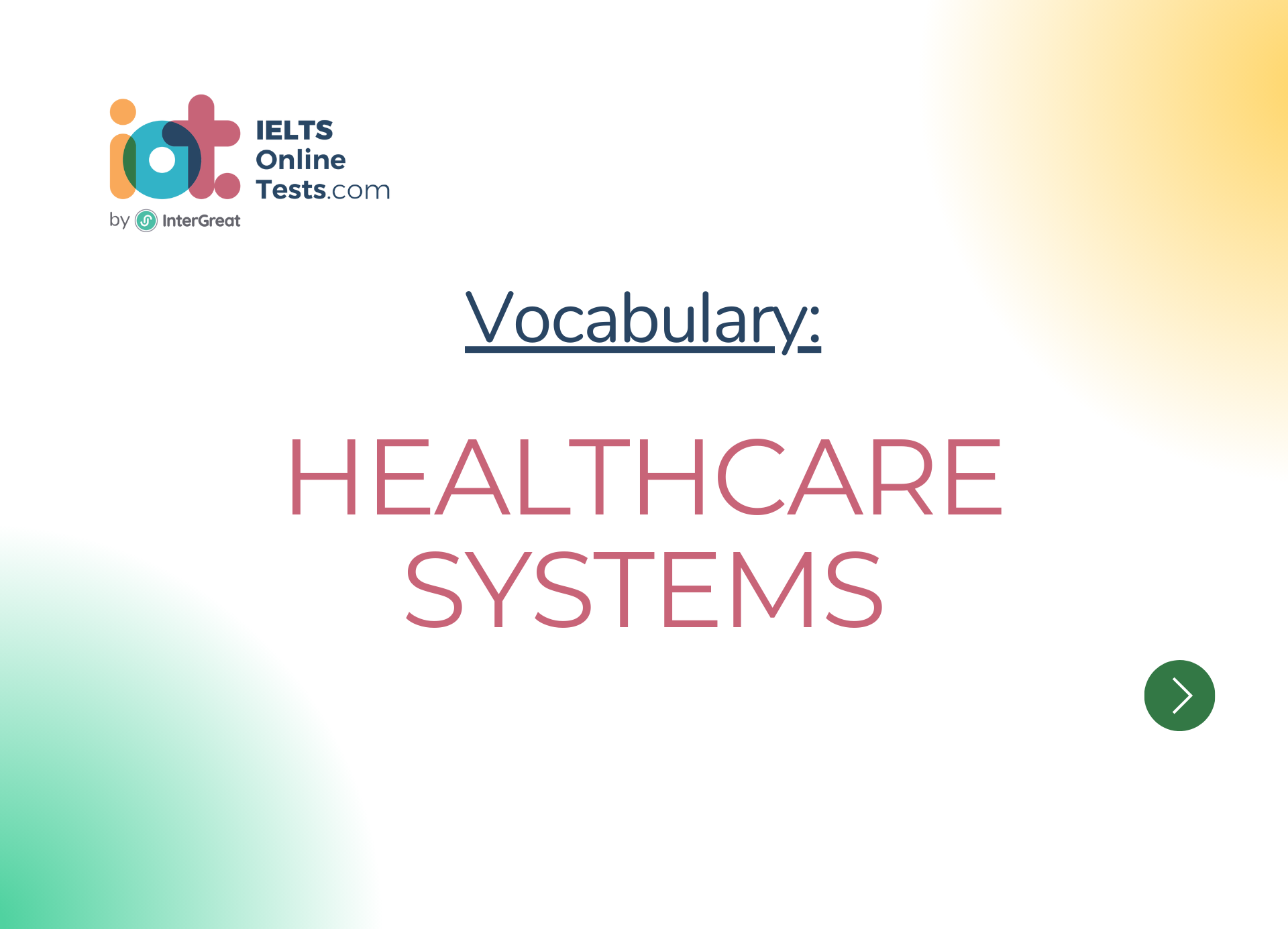
Healthcare systems
Below is a comprehensive list of vocabulary related to healthcare systems, along with their definitions. Understanding these terms will help you discuss various aspects of healthcare systems during the IELTS exam or any healthcare-related conversations.
Universal Healthcare:
Definition: A healthcare system where all citizens have access to essential medical services regardless of their ability to pay, typically funded through taxes.
Private Healthcare:
Definition: Medical services provided by private institutions or individuals, often requiring payment from patients or insurance coverage.
Public Healthcare:
Definition: Medical services provided and funded by the government to ensure healthcare accessibility for all citizens.
Health Insurance:
Definition: A contract between an individual and an insurance company that provides financial coverage for medical expenses.
Primary Care:
Definition: The first level of healthcare, usually provided by general practitioners or family doctors who offer basic medical services and referrals to specialists when needed.
Specialty Care:
Definition: Medical care provided by specialists who have expertise in a particular area of medicine, such as cardiologists, neurologists, etc.
Emergency Care:
Definition: Immediate medical treatment provided to patients facing life-threatening conditions or severe injuries.
Outpatient Care:
Definition: Medical services offered to patients who do not require hospitalization and can receive treatment in clinics or medical facilities.
Inpatient Care:
Definition: Medical treatment provided to patients who require hospitalization for intensive or extended care.
Preventive Care:
Definition: Healthcare services aimed at preventing illnesses or health problems, such as vaccinations, screenings, and health education.
Healthcare Access:
Definition: The ease with which individuals can obtain medical services and receive necessary healthcare.
Healthcare Equity:
Definition: Ensuring that all individuals have equal access to healthcare resources and services, regardless of their background or socioeconomic status.
Healthcare Quality:
Definition: The level of effectiveness, safety, and patient-centeredness of medical services provided within the healthcare system.
Healthcare Costs:
Definition: The expenses associated with medical services, including fees for consultations, treatments, medications, and medical equipment.
Electronic Health Record (EHR):
Definition: Digital records containing a patient's medical history, treatment plans, test results, and other health-related information.
Healthcare Policy:
Definition: Government regulations and guidelines that shape the healthcare system and influence the delivery and financing of medical services.
Healthcare Reform:
Definition: Efforts to improve or change aspects of the healthcare system to enhance accessibility, affordability, and quality of care.
Healthcare Provider:
Definition: A person or organization that delivers medical services, including doctors, nurses, hospitals, and clinics.
Healthcare Facility:
Definition: A physical location where medical services are provided, such as hospitals, clinics, and medical centers.
Healthcare Accreditation:
Definition: The process of evaluating and certifying healthcare facilities or providers to ensure they meet specific quality and safety standards.
Healthcare Resources:
Definition: The personnel, equipment, facilities, and funding available to provide medical services within a healthcare system.
Healthcare Outcome:
Definition: The result or impact of medical treatment on a patient's health and well-being.
Healthcare Waiting Times:
Definition: The length of time a patient must wait to receive medical services or treatments.
Healthcare Innovation:
Definition: The development and implementation of new technologies, methods, or approaches to improve healthcare delivery.
Healthcare Sustainability:
Definition: Ensuring the long-term viability and effectiveness of a healthcare system, considering both environmental and financial factors.
Healthcare Advocacy:
Definition: Efforts to promote and support the interests and rights of patients and the improvement of healthcare services.
Healthcare Legislation:
Definition: Laws and regulations that govern healthcare practices and policies.
Healthcare Stakeholders:
Definition: Individuals or groups with an interest in or influence over the healthcare system, including patients, healthcare providers, policymakers, and insurers.
Healthcare Allocation:
Definition: The process of distributing healthcare resources and services based on various criteria, such as need, cost, and effectiveness.
Healthcare Disparities:
Definition: Differences in healthcare access, outcomes, or quality experienced by various demographic groups, often related to social, economic, or racial factors.
Please note that healthcare systems can vary significantly between countries, and these terms may have different applications depending on the context. Understanding these vocabulary words will help you discuss healthcare-related topics more effectively during the IELTS exam or any discussions related to healthcare systems.




